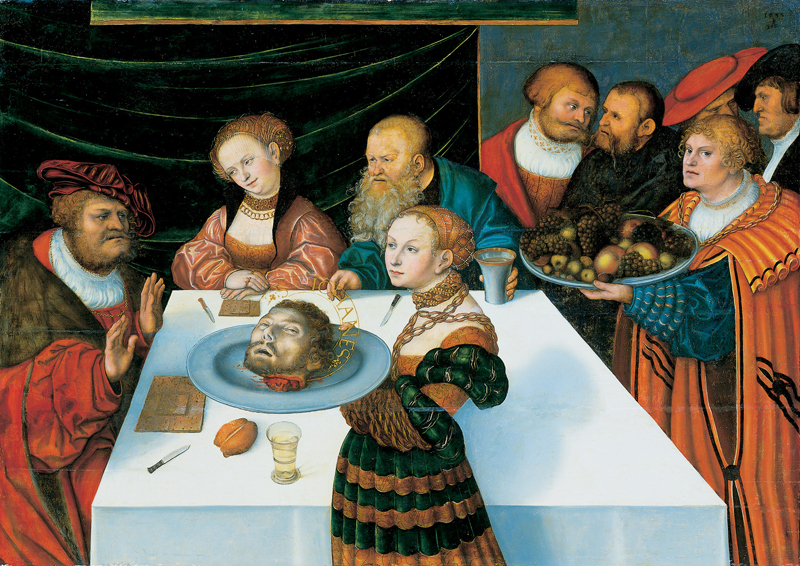
Feast of Herod
Lucas Cranach, 1533
My dear friends,
Today we encounter a tale of power, desire, and ultimately, spiritual consequence, as portrayed in the dramatic narrative of Herod and John the Baptist in Mark 6:14-29.
for Jesus' name had become known.
Some were saying, "John the baptizer
has been raised from the dead;
and for this reason
these powers are at work in him."
But others said, "It is Elijah."
And others said, "It is a prophet,
like one of the prophets of old."
But when Herod heard of it, he said,
"John, whom I beheaded, has been raised."
- Mark 6:14-16
The fear that haunted Herod upon hearing of Jesus' works reveals a conscience tormented by past actions, particularly his execution of John the Baptist. Despite John's attempts to cultivate spiritual awareness in Herod, his seeds of wisdom fell on thorny ground, choked by the weeds of Herod's worldly concerns and desires.
on account of Herodias, his brother Philip's wife, because Herod had married her.
For John had been telling Herod, "It is not lawful for you to have your brother's wife."
- Mark 6:17-18
John's imprisonment was a direct result of his uncompromising commitment to truth, challenging Herod's unlawful marriage. Yet, in a twist of irony, it is Herod who becomes the true prisoner, shackled not by chains but by his own deep-seated fears and worldly attachments.
But she could not, for Herod feared John,
knowing that he was a righteous and holy man, and he protected him.
When he heard him, he was greatly perplexed; and yet he liked to listen to him.
- Mark 6:19-20
Herod's perplexity upon hearing John's words hints at a fleeting awareness of a higher moral path, yet his failure to act on this awareness, trapped by his desires and fear of public opinion, foreshadows his spiritual downfall.
for his courtiers and officers and for the leaders of Galilee.
When his daughter Herodias came in and danced, she pleased Herod and his guests;
and the king said to the girl, "Ask me for whatever you wish, and I will give it."
And he solemnly swore to her, "Whatever you ask me, I will give you, even half of my kingdom."
- Mark 6:21-23
In a moment of revelry, Herod's promise to Herodias' daughter exposes the extent of his enslavement to pride and impulse, setting the stage for a tragic fulfillment of Herodias' vengeful desires.
She went out and said to her mother, "What should I ask for?"
She replied, "The head of John the baptizer."
Immediately she rushed back to the king and requested,
"I want you to give me at once the head of John the Baptist on a platter."
The king was deeply grieved;
yet out of regard for his oaths and for the guests, he did not want to refuse her.
- Mark 6:24-26
Herod's deep grief at the request reveals a glimmer of his recognition of John's righteousness, yet his subsequent decision underscores his ultimate spiritual demise, prioritizing worldly honor over moral integrity.
He went and beheaded him in the prison,
brought his head on a platter, and gave it to the girl.
Then the girl gave it to her mother.
When his disciples heard about it, they came and took his body, and laid it in a tomb.
- Mark 6:27-29
The final act of delivering John's head on a platter not only fulfills Herodias' gruesome wish but also symbolizes Herod's complete surrender to worldly desires, marking his spiritual death even as he continues to reign in the material world.
In the tragic tale of Herod and John the Baptist, we witness a vivid illustration of the spiritual perils of allowing worldly concerns and fears to overshadow moral and spiritual truths. May this story serve as a reminder of the paramount importance of spiritual integrity and the dangers of ignoring the seeds of wisdom sown by the prophets among us.